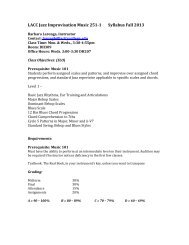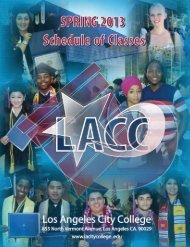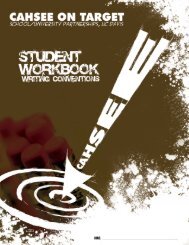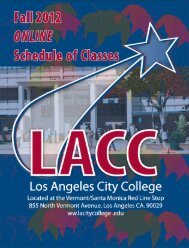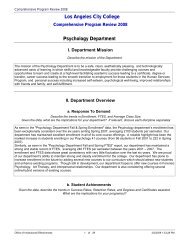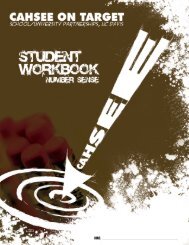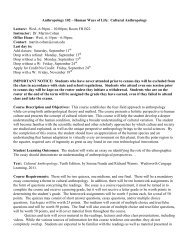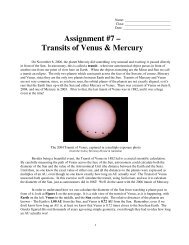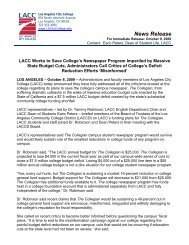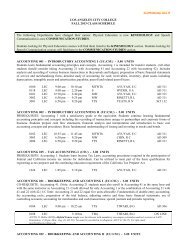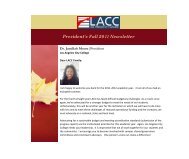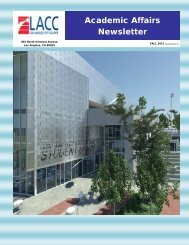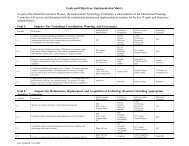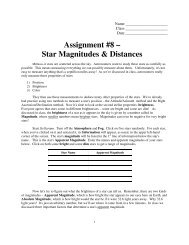LACC Vision & Mission Statements As Approved By - Los Angeles ...
LACC Vision & Mission Statements As Approved By - Los Angeles ...
LACC Vision & Mission Statements As Approved By - Los Angeles ...
Create successful ePaper yourself
Turn your PDF publications into a flip-book with our unique Google optimized e-Paper software.
All <strong>LACC</strong> pre-nursing students must complete Chemistry 60 or Chemistry<br />
68 with a satisfactory grade to satisfy the chemistry requirement for the<br />
<strong>LACC</strong> Nursing Program. Chemistry 51 does not satisfy the <strong>LACC</strong> Nursing<br />
chemistry requirement.<br />
CHEMISTRY 51<br />
Fundamentals of Chemistry I<br />
5 UNITS - (UC:CSU)<br />
Advisory: Mathematics 115 or one year of high school algebra.<br />
Lecture 3 hours. Laboratory 4 hours.<br />
Chemical phenomena, methodology, and theory are studied in the context<br />
of social, political, and economic issues. Fundamental chemical principles<br />
are developed and applied within the study of selected instructional modules,<br />
such as atmospheric gases, acid rain, nuclear fission, solar energy,<br />
drugs, and nutrition. The laboratory component gives students experience<br />
in the general procedures used by chemists and the ncertainty involved in<br />
operations.<br />
CHEMISTRY 60<br />
Introduction to General Chemistry<br />
5 UNITS - (UC:CSU)<br />
Prerequisite: Mathematics 115 or appropriate score on the placement<br />
assessment.<br />
Advisory: Eligibility for English 28/31. See “Chemistry Enrollment<br />
Information.<br />
Lecture 3 hours. Laboratory 4 hours.<br />
A general basic chemistry course with laboratory, emphasizing fundamental<br />
principles of inorganic and physical chemistry, nomenclature of inorganic<br />
compounds, ionic and covalent bonding, problem solving, gas laws and<br />
solutions. This course serves as preparation for Chemistry 101, and meets<br />
the IGETC and CSU general education requirements for physical science<br />
with<br />
CHEMISTRY 68<br />
Preparation for General Chemistry<br />
5 UNITS - (UC:CSU)<br />
Prerequisite: Math 115 or appropriate score on the placement assessment<br />
Advisory: Eligibility for English 28/31. See “Chemistry Enrollment<br />
Information.”<br />
Lecture 3 hours. Conference 2 hours. Laboratory 4 hours.<br />
A general basic chemistry course with laboratory and conference sections,<br />
emphasizing fundamental principles of inorganic and physical chemistry,<br />
nomenclature of inorganic compounds, ionic and covalent bonding, problem<br />
solving, gas laws and solutions. This course serves as preparation for<br />
Chemistry 101, and satisfies the IGETC and CSU general education requirements<br />
for physical science with laboratory.<br />
CHEMISTRY 101<br />
General Chemistry I<br />
5 UNITS - (UC:CSU)<br />
Prerequisite: Chemistry 60 or 68 and Mathematics 125<br />
Advisory: English 28.<br />
Students who have not completed Chemistry 60 or 68 or the equivalent<br />
are required to pass the chemistry readiness examination prior to<br />
enrolling in Chemistry 101. See “Chemistry Enrollment Information.”<br />
Lecture 3 hours. Laboratory 4 hours. Conference 2 hours.<br />
Lecture topics include nomenclature, atomic structure, quantum theory,<br />
bonding theories and molecular geometry, chemical equations,<br />
stoichiometry, thermochemistry, solid, liquid and gaseous states and<br />
related forces, gas laws, solutions and colligative properties, periodic<br />
relationships, and acid base theories. Laboratory exercises are<br />
quantitative in nature and are related to the lecture topics<br />
LOS ANGELES CITY COLLEGE 80TH ANNIVERSARY CATALOG 2008-2009<br />
CHEMISTRY 102<br />
General Chemistry I<br />
5 UNITS - (UC:CSU)<br />
Prerequisite: Chemistry 101 and Mathematics 125<br />
Advisory: English 28/31.<br />
Lecture 3 hours. Laboratory 4 hours. Conference 2 hours.<br />
Lecture topics include chemical kinetics, general and ionic equilibria, thermodynamics,<br />
electrochemistry and redox reactions, structure and bonding in transition<br />
metal complexes and carbon compounds.<br />
Laboratory topics include reaction kinetics, equilibrium constant determination,<br />
chemical and spectroscopic methods of qualitative and quantitative analysis,<br />
potentiometric titration techniques, and electrochemistry for both organic and<br />
inorganic systems.<br />
CHEMISTRY 211<br />
Organic Chemistry for Science Majors I<br />
5 UNITS - (UC:CSU)<br />
Prerequisites: Chemistry 102.<br />
Advisory: English 28/31.<br />
Lecture 3 hours. Laboratory 4 hours. Conference 2 hours.<br />
Introduces the structure, nomenclature and reactions and properties of organic<br />
compounds. Introduces spectroscopy as applied to organic compounds.<br />
Preparation and isolation of organic compounds and determination of physical<br />
properties are studied in the laboratory.<br />
CHEMISTRY 212<br />
Organic Chemistry for Science Majors II<br />
5 UNITS - (UC:CSU)<br />
Prerequisite: Chemistry 211.<br />
Advisory: English 28/31.<br />
Lecture 3 hours. Laboratory 4 hours. Conference 2 hours.<br />
Introduces the structure, reactions, nomenclature and properties of organic<br />
compounds, and spectroscopic techniques. Laboratory work includes the<br />
synthesis of compounds, the use of spectroscopy and the determination of<br />
compound identity based on properties and reactions.<br />
CHEMISTRY 221<br />
Biochemistry for Science Majors<br />
5 UNITS - (UC:CSU)<br />
Prerequisite: Chemistry 211.<br />
Lecture 3 hours. Laboratory 4 hours. Conference 2 hours.<br />
This course is intended as a preparation for careers in the physical and biological<br />
sciences, medical and dental professions, veterinary and agricultural<br />
science, nutrition and food chemistry, and related fields. Topics relate to the<br />
chemistry and metabolism of biological compounds and include discussion of<br />
proteins, lipids, carbohydrates and nucleic acids. Laboratory work includes<br />
electrophoresis, chromatography, spectroscopy, and enzyme purification and<br />
kinetics.<br />
CHEMISTRY 185 Directed Study - 1 UNIT (CSU) (RPT2)<br />
CHEMISTRY 285 Directed Study - 2 UNIT (CSU)<br />
CHEMISTRY 385 Directed Study - 3 UNIT (CSU)<br />
Prerequisite: Chemistry 102<br />
Students pursue Directed Study in Chemistry on a contract basis under the<br />
direction of a supervising instructor. Laboratory and literature research is<br />
performed.<br />
- 71 -



